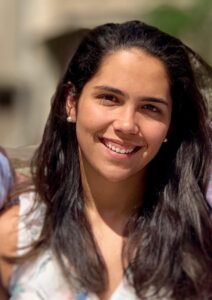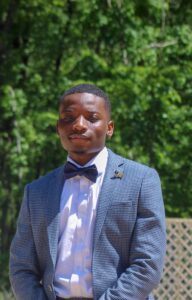
This is a post by Kate Blankinship and Curtis Hills. Kate and Curtis are Emerson National Hunger Fellows from the Congressional Hunger Center. They have joined Alabama Arise to assist our work on policies to reduce hunger and poverty.
We only went in for porch lights and flowers, but we were met with stares of unease and disapproval. Both of us noticed the shoppers’ reactions, yet neither of us mentioned the shared experience until that evening, as we sat on the porch admiring our baby pine tree named “Piney” and the dim lights hanging above.
That night in Lowe’s was a stark reminder that our differences matter more to many people than any similarity. Kate is from Memphis but matriculated to Chicago for college at the University of Chicago. Curtis is from Lexington, Miss., and stayed in-state to attend the University of Mississippi. Kate is a white woman; Curtis is a Black man. She is spiritual; he is religious. She is queer; he is heterosexual.
The experiences and mission that bring us together
We moved to the Montgomery area in September, brought together by the Congressional Hunger Center as Emerson Fellows. For five months, we will partner with the nonprofit Alabama Arise to do research surrounding hunger and poverty.
Our passion for this work is only one of our many similarities. We both grew up in the South and fall seamlessly into thick, Southern drawls. We both attended public schools and lost a parent in adolescence. And we both have experienced times of poverty.
As we work on issues related to hunger and poverty, we are keenly aware of how each part of our own identity impacts our approach. We also keep in mind the identities of those with whom we work when researching social welfare programs, looking at policies and advocating for others. While at Arise, we will have separate but related projects.
What Kate is doing at Arise

Kate is researching childhood nutrition. Specifically, she is talking to child nutrition professionals and community members about their experiences with the Community Eligibility Provision (CEP) in Alabama public schools. Kate will place at the forefront of her research those who work directly with the National School Lunch Program (NSLP) and benefit from NSLP and/or CEP. Using data as a backbone, she will let their voices drive the narrative.
Kate’s work will include developing a video to highlight CEP’s benefits and demystify its complexities through the storytelling of parents, policy researchers and School Child Nutrition Program directors. She will write a report on her CEP-related findings that will discuss the long-term mental health impacts of food insecurity. The report also will examine the lingering impact on current policies of NSLPs having started as a military readiness strategy. In addition, Kate will work with Arise staff to develop state policy proposals to minimize barriers to opting into CEP.
What Curtis is doing at Arise

Curtis will work to illuminate Alabamians’ voices through social media content creation and outreach. He will generate content that speaks to a range of current hunger-related issues affecting Alabamians. These issues include:
- Data collection on Pandemic EBT (P-EBT).
- The benefits of WIC enrollment for toddlers.
- The role that the Supplemental Nutrition Assistance Program (SNAP) plays in supporting Alabama’s food stores and systems.
Curtis also will draft social media messages for local hunger and education advocates to use in encouraging their local schools to take up the option. And he will develop a blog series highlighting Arise’s work, particularly his activities and those of his fellow Fellow, Kate.
Conversations are only the beginning of the work
Due to COVID-19, we do most of this work within the walls of our apartment and on our now-decked-out-in-fall porch. But it took only one night of living together before we started diving into conversations that extend beyond our work. These are deep conversations we believe many Americans aren’t yet willing to have. And we soon realized we were going to learn about much more than hunger and poverty.
If so much understanding can come from digesting conversations and experiences, then why do more people not use this model? We are learning from our ability to listen and willingness to engage in conversations. And we have decided not to shy away from the gazes we receive when we go out. Instead, we acknowledge them internally and return home and talk about it.

Yet our experience at Lowe’s that night also helped us realize further something that we already knew. Having conversations is a necessary component of our work, but it is by no means sufficient by itself to make the changes we hope to make one day in our lives, careers and society.
The conversations we’ve been having within our apartment will not change our experiences once we leave. That is going to take a lifetime of work.

